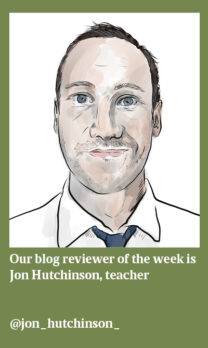Teaching writing, ranking schools, structuring curriculum and powerful knowledge for leaders are Jon Hutchinson’s top picks of the education topics this week
How should we teach writing in primary schools?
@solomon_teach
Any primary school teacher knows that teaching writing is perhaps the most complex and challenging aspect of the job. Solomon Kingsnorth points out that any particular unit of work contains “an extraordinary number of things that a novice writer is expected to do successfully”, using real resources to illustrate the demand. Restated within “the language of cognitive science”, Kingsnorth notes that “many writing lessons contain a very high level of element interactivity”. It seems that the current scenario, where “almost a quarter of children” fail to reach a surprisingly modest ‘expected standard’ is not only predictable but inevitable, given the orthodox approach to teaching writing.
The voodoo art of ranking schools
@profbeckyallen
Education is rife with junk data. From pupil progress meetings to political declarations, we mostly receive and rehearse a diet of lies, damned lies and statistics. Thankfully, Becky Allen is on hand to cut through the noise and elucidate the different analyses relevant to school rankings in a way that doesn’t make my brain dribble out of my ear. In this post, Allen looks at the manner in which we currently rank schools against each other, and sets out the case for the prosecution. The argument is far more sophisticated and nuanced than the senseless cries to scrap any sort of accountability. As Allen herself concludes: “Many people who don’t like school rankings are warm, optimistic people who believe life would be rosy without school accountability. I’m not one of those people – monitoring schools has its merits, but we have to do it on the basis of comparisons that are valid.”
How to teach an essay on the Battle of Hastings
@bennewmark
Although certain specialised knowledge and evidence-based strategies can help expedite a teacher’s journey to expertise, there really is no substitute for hard-won experience. In this post, we get to borrow some of Ben Newmark’s as he sets out step by step how to teach an essay on the Battle of Hastings. A niche explainer, you may be thinking, but the process that Newmark reveals in terms of what he expects pupils to achieve (and, crucially, what he no longer insists on) can be followed for any subject. There is an honesty and authenticity to this post which I find refreshing and, as a teacher, relatable. Newmark seems to confess with a shrug that the work is “heavily structured, led largely by me, certainly not everything and certainly not perfect, but a solid start build upon”. And I’d suggest that, when planning the next big piece of work you expect pupils to complete, this blog from Newmark is just the kind of foundation you’ll be looking to build on.
Powerful knowledge in the teaching of educational leadership
@nmgilbride
Over the past decade, the latest chapter in the ongoing epic battle between skills and knowledge has been lost and won. With the Department for Education and Ofsted now aligned in their insistence upon a knowledge-rich approach to curriculum, schools have been busily rewriting schemes of work from scratch. Whilst the tremendous workload that this has created (rightly) irks many, I can’t confess to being too cynical since I think it is probably a good thing that schools are thinking about exactly what they are teaching, when and why. It doesn’t make you very popular to say, “Well this is something that we should have been doing all along,”, but, well, it is probably something that we should have been doing all along. A welcome addition to this discussion is provided here by Neil Gilbride, who considers the role of “powerful knowledge” in educational leadership. Arguing that “to develop critical leaders, we need knowledgeable leaders”, Gilbride sets out three relevant theories and threshold concepts that might help us to get them.













Your thoughts